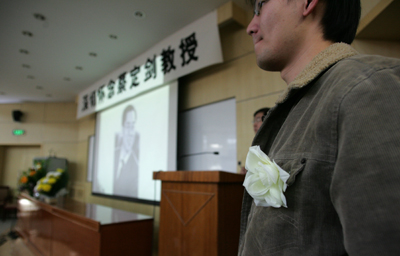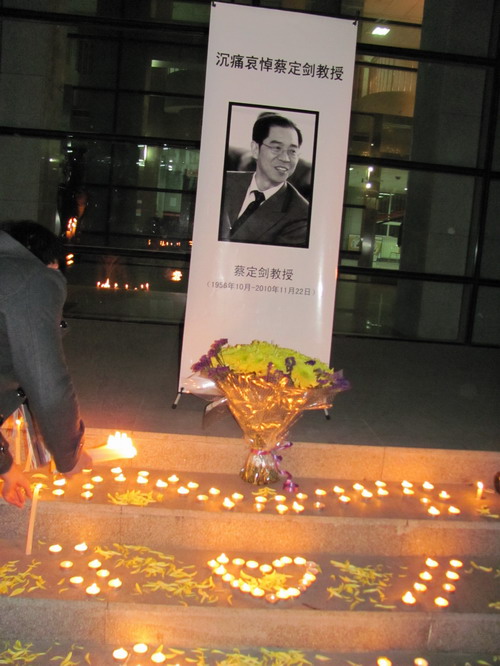He was also a dedicated member of the Center for People's Congress and Foreign Legislative Studies, and the Research Center for Human Rights and Humanitarian Law, at Peking University.
A former advisor to the National People’s Congress, Cai particularly supported a strengthened role for the people’s congress system as a check on executive Party decisions, believing this to be essential to the maturation of China’s legal system. However, he was critical of the institution’s development in the years since 2003, saying earlier this year that “There has been no further strengthening of the role of the NPC,” more emphasis was put on the NPC being led by the party.”
After leaving the NPC, Cai started to write articles on media, focusing on topics such as constitutional interpretation and the development of democracy in China. At each annual joint session of the NPC and the Chinese People’s Political Consultative Conference (CPPCC), Cai explained China’s budget law to the media. Speaking to a Caijing Magazine reporter, Cai stated his belief that as the highest representative body of China, the NPC’s most important responsibility is to “look after people’s wallets.” According to him, the importance of the national budget issues should be stressed “every day, every month, and every year.”

A ceremony in memoriam of Prof. Cai Dingjian at CUPL (CUPL News)
Cai Dingjian was also an ardent supporter of China’s democratic development and an elections expert. As chief researcher at CUPL, Prof. Cai led a team to complete the Report on the Situation of Chinese Elections, in which Cai pointed out that indifference to elections has become commonplace in China. The key reason for this disinterest, he argued, was that the election process had become completely divorced from the interests of citizens. Countering the argument made by many of his colleagues, who contend that civic qualifications and education are necessary prerequisites for open elections, Cai believed that the ability of candidates to articulate citizen interests determines an election’s success. To support his argument, Cai Dingjian provided experience from some of China’s poorest and least educated areas, in Anhui, Sichuan, and Hebei provinces, showing that farmers there are passionate about elections and voting.
In an article written for Southern Weekend , Cai said that “Democratic practice is the best democratic education. Practice in direct democracy is worth 100 times more than democratic education.”
Regarding the political development in China for the next ten years, Cai laid out a path with three important steps:
1. Through intra-party democracy, the rule of selecting leaders by democratic elections to a certain degree should be established. Local Party organizations should be selected using democratic elections as well.
2. The long ignored public budget system should be placed high on the agenda, and an open and democratic budget system should be implemented. Criticisms and questions would be noted on the open budget report, and those doubts will lead to the budget’s refinement and democratization.
3. Public participation will be improved in different areas and at various levels. The government should insist on a people-oriented governing philosophy. Increased public participation will increase government accountability and will become an important aspect of democracy.

A candlelight memorial at CUPL
Because of his liberal mind and tireless support for democracy, Cai Dingjian won respect from his colleagues and students, and there has been an unprecedented outpouring in the aftermath of his death. A candlelight memorial was organized spontaneously by students from CUPL, attracting more than 500 students, and countless students and scholars have left postings on bulletin boards (BBS) mourning Cai’s death. One student said that “the light of Prof. Cai’s life has been snuffed, but the spark on the road toward constitutional democracy is still shining.”
A memorial service will be held for Prof. Cai on Friday, Nov. 26, scheduled to begin at 8:00 am at the Babaoshan cemetery.
In his last interview, three days before his death, Prof. Cai reaffirmed his belief in the shining light of democracy.
“Constitutional democracy," said Prof. Cai, "is the mission of our generation.”
Reported by: Jennifer Smith and Bernice Ma
Edited by: Jacques
Source: China Elections and Governance